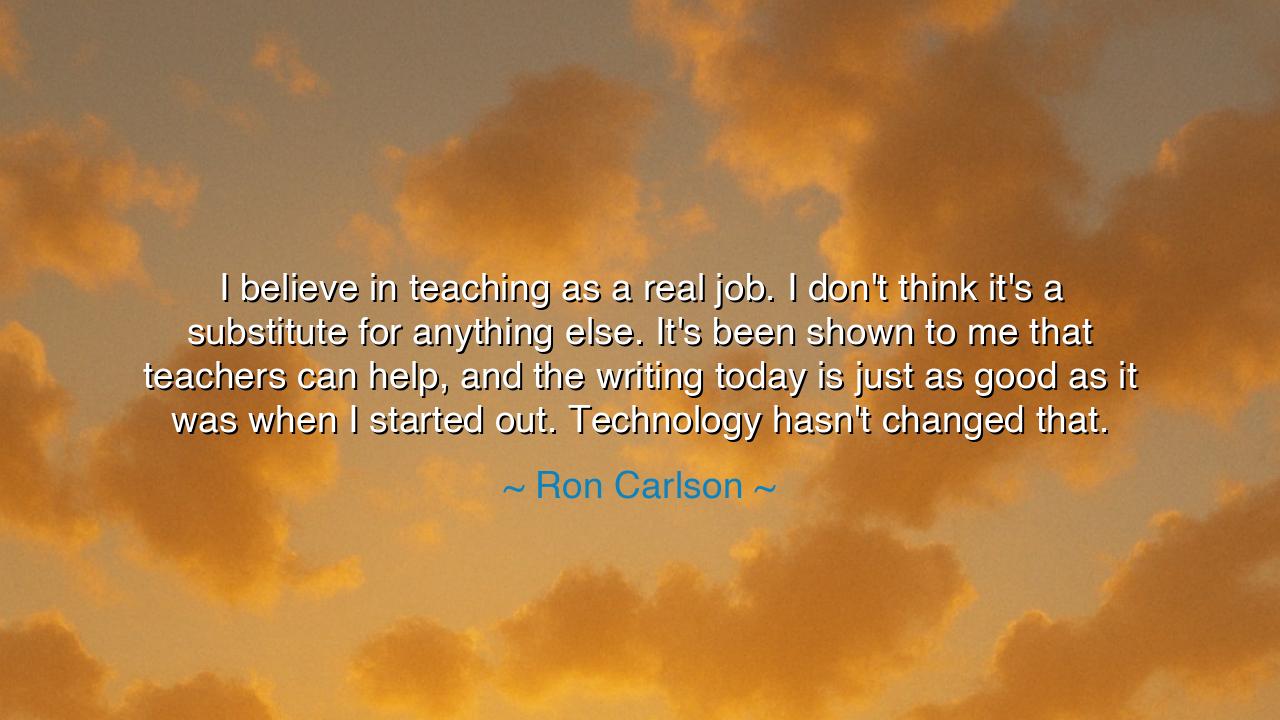
I believe in teaching as a real job. I don't think it's a
I believe in teaching as a real job. I don't think it's a substitute for anything else. It's been shown to me that teachers can help, and the writing today is just as good as it was when I started out. Technology hasn't changed that.






Ron Carlson, with the reverence of one who has walked long in the halls of literature, once declared: “I believe in teaching as a real job. I don’t think it’s a substitute for anything else. It’s been shown to me that teachers can help, and the writing today is just as good as it was when I started out. Technology hasn’t changed that.” These words, spoken with quiet force, remind us of the dignity of teaching, the enduring power of writing, and the limits of technology in shaping the deepest parts of human expression.
The first truth Carlson offers is this: teaching is a real job. In an age when teaching is often undervalued or treated as a stepping-stone to other pursuits, he affirms its sacredness. Teaching is not a substitute for “something greater”—it is itself a calling, a labor of patience and courage that shapes generations. To stand before students and open the door to knowledge is to hold in one’s hands the future of civilization. This is not secondary work, but foundational work, upon which all other work depends.
He then proclaims the power of teachers themselves. “It’s been shown to me that teachers can help,” he says, and in this confession is both humility and awe. The actor, the soldier, the ruler may influence history in grand strokes, but it is the teacher who quietly plants the seeds from which all greatness grows. Socrates never wrote a book, yet his patient teaching gave birth to Plato, to Aristotle, and thus to the very foundations of philosophy. The influence of teachers is invisible yet immeasurable, and Carlson rightly places it among the most noble of human labors.
Carlson also insists that writing today is just as good as it was when he started out. Here lies a defiance against cynicism. Many declare that art is in decline, that technology and distraction have ruined the craft. But Carlson, with the wisdom of years, affirms that the spirit of human expression is undiminished. Every generation births its poets, its storytellers, its truth-tellers. The fire that burned in Homer, in Shakespeare, in Baldwin, still burns today. The tools may change, the stage may shift, but the human soul continues to pour itself into words with undying force.
And then, perhaps most strikingly, he reminds us that technology hasn’t changed that. Technology may alter the way we share stories, the speed at which we write them, the platforms on which they live. Yet it cannot alter the essence of storytelling itself: the shaping of thought, the weaving of emotion, the reaching across time and space from one human heart to another. Just as the printing press did not make stories less sacred, so too the digital age has not stripped writing of its depth. It is the heart of the writer, not the tool, that makes the work endure.
History proves this again and again. Consider the rise of the novel in the 18th century. Many critics of the time scorned it as inferior to poetry or drama, just as some today scorn the digital story, the online essay, or the self-published book. Yet the novel became one of the greatest forms of art, carrying the voices of Austen, Dickens, and Tolstoy. The form changes, but the art remains. Carlson’s insight is thus both ancient and modern: that technology is a tool, but never the soul of creation.
The lesson, then, is twofold. First: honor teachers, for they are not placeholders but builders of worlds, shaping minds and hearts in ways that echo far beyond the classroom. Second: honor writing, in every age and form, for its spirit remains unbroken by the shifting sands of technology. Do not despise the new, nor worship the tool, but look always to the heart that creates. For it is in patience, in craft, and in the courage to express truth that writing lives—and this truth, as Carlson teaches us, is eternal.
Therefore, O seekers of wisdom, carry this forward: respect the calling of teaching, nurture the flame of writing, and use technology only as a servant, never as a master. For tools will change, but the human spirit will always find a way to speak. And as long as there are teachers and writers, the soul of humanity shall never fall silent.






AAdministratorAdministrator
Welcome, honored guests. Please leave a comment, we will respond soon